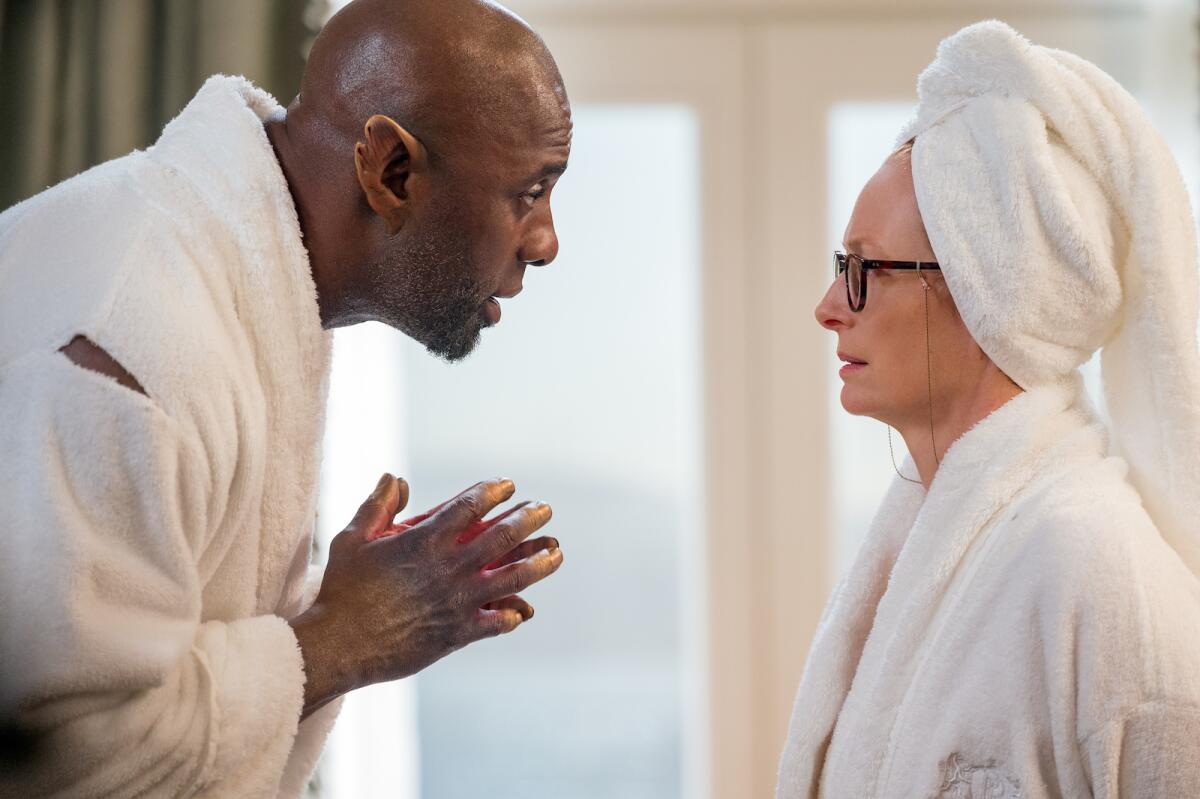Review: In ‘Three Thousand Years of Longing,’ the existential questions go unanswered

- Share via
Australian filmmaker George Miller’s latest cinematic exploration of humanity is a far cry from the dusty, diesel-fueled “Mad Max” franchise for which he is known, and it proves a moment of respite between 2015’s “Mad Max: Fury Road” and the currently filming prequel to that film, “Furiosa.”
Based on the short story “The Djinn in the Nightingale’s Eye” by A.S. Byatt, adapted by Miller and Augusta Gore, “Three Thousand Years of Longing” is a philosophically ambitious project, a cerebral exploration of the function of storytelling in human existence and the meaning of desire.
It is a nested Matryoshka doll of stories. The outer layer is told by Alithea (Tilda Swinton), a narratologist who has made her way to Turkey for a conference. Upon arrival, she starts to encounter mysterious, magical figures, what she calls djinn (another word for “genie,” referring to the Muslim belief in invisible spirits that inhabit the world and take the form of humans or animals). While giving a talk about the continuing purpose of myth in our modern, science-based world, she is spooked by a djinn in the audience and faints.
For your safety
The Times is committed to reviewing theatrical film releases during the COVID-19 pandemic. Because moviegoing carries risks during this time, we remind readers to follow health and safety guidelines as outlined by the CDC and local health officials.
The film’s script is so densely packed with mythological insight that some scenes almost gloss over interesting concepts like the one Alithea discusses in her talk, which questions the function of gods, monsters and creation myths in everyday life when we have science to tell us where we came from. But even if Miller doesn’t linger on these ideas, they remain in the background of “Three Thousand Years of Longing,” constantly informing the rest of the film.
The story inside Alithea’s belongs to the main djinn she encounters after purchasing a mysterious glass bottle in a bazaar and scrubbing it clean. The Djinn (Idris Elba), explodes into her hotel room, requesting that she make three wishes. Alithea declines, insisting that stories about making wishes are cautionary tales, and there’s really nothing she needs or desires in her independent, solitary, academic life. The pair, clad in white hotel robes, sit for a chat, and the Djinn tells his story, of the three times he’s been “incarcerated” in his bottle, and the danger of wishes unfulfilled, which rob him of his purpose.
Rendered with stunning beauty and daring visuals by Miller, these 3,000 years of history, from the Queen of Sheba through various slaves and sultans and trips to the bottom of the Bosporus, explore the danger of wishing and the undeniable power of desire. In hearing the Djinn’s story, Alithea comes to understand her purpose, which is to love him. Whether they can harmoniously coexist in the modern world, full of so many busy frequencies and electromagnetic fields, is another question altogether.
Miller’s vision is an earnest and high-minded one, with more insights about humanity and storytelling packed into a tossed-off moment than most entire films contain. But it’s also a deeply odd film, spanning centuries but contained to the interaction between Alithea and the Djinn. In line with core tenets of Miller’s genre-spanning work, it most clearly espouses the questions of human existence, human desire and how it’s desire that makes us human, whether for love or survival or both.
Miller asks the audience to level up its existential exploration, posing questions about the purpose of storytelling and, perhaps, about the lack of magic in our technological, science-driven world. But the film doesn’t offer any concrete answers, leaving us adrift in a sea of provocative queries. For a film about narrative, it meanders, and loses focus.
The only messages or lessons in “Three Thousand Years of Longing” are to be gleaned ourselves from the clues left behind, which is a fascinating — if a bit frustrating — experience.
Katie Walsh is a Tribune News Service film critic.
'Three Thousand Years of Longing'
Rated: R, for some sexual content, graphic nudity and brief violence
Running time: 1 hour, 48 minutes
Playing: In general release Aug. 26
More to Read
Only good movies
Get the Indie Focus newsletter, Mark Olsen's weekly guide to the world of cinema.
You may occasionally receive promotional content from the Los Angeles Times.










